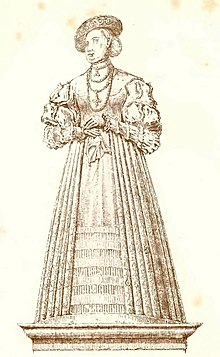Barbara of Brandenburg (1464-1515)
Barbara von Brandenburg (born May 30, 1464 in Ansbach ; † September 4, 1515 ibid) was a Margravine of Brandenburg and successively by marriage Duchess of Glogau and Queen of Bohemia .
Life
Barbara was a daughter of the Brandenburg Elector Albrecht Achilles (1414–1486) from his second marriage to Anna (1436–1512), daughter of Elector Friedrich II of Saxony .
At the age of eight she was born on October 11, 1472 in Berlin with the significantly older Duke Heinrich XI from Glogau . (1429 / 35–1476) engaged and married to him in 1474. However, the much older duke died only two years later. In his will he designated his wife as heir, which led to the long-term Glogau succession dispute. King Wladislaw II of Bohemia and King Matthias Corvinus of Hungary also made claims to the inheritance. At the end of the succession dispute, in which Barbara, who had the estates on her side, had to prevail against the cousin of her deceased husband, Hans von Sagan , the Duchy of Crossen with Bobersberg , Züllichau and Sommerfeld came to Kurbrandenburg and became part of Silesia detached. Those territories were pledged by Duke Heinrich to Albrecht Achilles in exchange for Barbara's marriage property of 50,000 guilders.
Albrecht Achilles appointed Otto von Schenk to the state administrator for his daughter. Just six months later, on August 20, 1476, the twelve-year-old widow was married by procurationem to King Wladislaw II of Bohemia, who wanted to move in the Duchy of Glogau as a settled fiefdom and had renewed an inheritance association with Brandenburg.
Due to the events of the war, Barbara was initially unable to travel to her husband. Later, the never consummated marriage became a nuisance for Wladislaw, as he wanted to gain the crown of Hungary by marrying the widow of the Hungarian King Matthias Corvinus, Beatrix of Aragón , so that he no longer wanted to let his bride come to him and sought separation. The Brandenburg ambassadors in this matter, Georg von Stein and Christoph von Vitzthum, were told by the king: “ Your Marggraf is white, but he shouldn't try his hand at me in the things that are against me. ”In anger, Albrecht Achilles asked for compensation in 1481 and tried to make the marriage indissoluble from the bishops of Bamberg and Würzburg. He even offered his 10-year-old daughter Dorothea as a replacement.
Finally, against the will of her family, Barbara asked the Pope to dissolve her marriage. At the same time she promised the knight Konrad von Heideck marriage. As a reaction to her self-will, Barbara was imprisoned by her family in the Plassenburg until von Heideck broke off the engagement. Five years later, on April 7, 1500, Pope Alexander VI decreed in a solemn bull . the dissolution of her marriage to King Vladislav.
Since then, nothing more has come down to us from Barbara von Brandenburg, she probably stayed at the Plassenburg, where her brother Friedrich was also imprisoned. According to Max Döllner, she is said to have moved to her mother in Neustadt an der Aisch after her release from prison .
reception
Barbara von Brandenburg was used as a template for the historical novel The Margravine by Sabine Weigand . Here the biography was processed to a large extent; only the plot was moved to the time of Prince Albrecht Alcibiades of Brandenburg-Kulmbach .
literature
- Colmar Grünhagen : Barbara, Margravine of Brandenburg . In: Allgemeine Deutsche Biographie (ADB). Volume 2, Duncker & Humblot, Leipzig 1875, p. 49 f.
- Josef Hemmerle : Barbara. In: New German Biography (NDB). Volume 1, Duncker & Humblot, Berlin 1953, ISBN 3-428-00182-6 , p. 581 f. ( Digitized version ).
- Karl Adolf Constantin von Höfler: Barbara, Margravine of Brandenburg, widowed Duchess in Silesia, wed Queen of Bohemia, fiancee Konrads Herr zu Haydek: A German image of a prince from the 15th century , self-published, 1867
- Gustav Adolf Harald Stenzel: History of the Prussian State: From the year 1191 to 1640 , F. Perthes, 1830, p. 241 f.
- Julius von Minutoli: The imperial book of the Margrave Albrecht Achilles , Schneider, 1850, p. 488 ff.
Individual evidence
- ↑ Gerhard Köbler: Historical Lexicon of the German States: the German territories from the Middle Ages to the present , CH Beck, 2007, p. 125
- ↑ Karl Friedrich Pauli: General Prussian State History, including all associated kingdoms, electoral duchies, duchies, principalities, counties and lordships, from proven writers and documents up to the present government , Volume 7-8, CP Francken, 1767, p. 575
- ↑ Alexander von Daniels: Handbuch der deutschen Reichs- und Staatsrechtsgeschichte , Volume 2, Laupp, 1862, p. 260
- ^ Max Döllner : History of the development of the city of Neustadt an der Aisch until 1933. 1950; 2nd edition, Ph. CW Schmidt, Neustadt an der Aisch 1978, ISBN 3-87707-013-2 , p. 51 f.
- ↑ www.histo-couch.de
| predecessor | Office | Successor |
|---|---|---|
| Johanna von Rosental | Queen of Bohemia 1476–1490 |
Beatrix of Aragon |
| personal data | |
|---|---|
| SURNAME | Barbara of Brandenburg |
| BRIEF DESCRIPTION | Duchess of Glogau, Queen of Bohemia |
| DATE OF BIRTH | May 30, 1464 |
| PLACE OF BIRTH | Ansbach |
| DATE OF DEATH | September 4, 1515 |
| Place of death | Ansbach |
